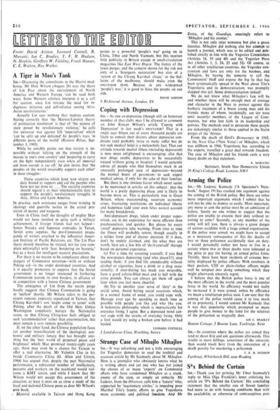Coping with Depression SIR.—As one ex-depressive (though still an honorary
member of that club). may I be allowed to comment on John Rowan Wilson's article 'Coping with Depression' in last week's SPECTATOR? That in a single year fifteen out of every thousand people are likely to consult their doctors about depressive con- ditions (and probably twice as many suffer but do not seek medical help) is a melancholy fact. That our attitude towards mental illness (including depression) is now more enlightened is encouraging; also that new drugs enable depressives to be successfully treated without going to hospital. I would certainly advise all people who find themselves stuck in an unusually prolonged state of depression—beyond the normal bouts of pessimism—to seek expert medical advice, if only for the sake of their families.
But there is one obvious factor which never seems
to be mentioned in articles on this subject: that the world is a pretty depressing place, and is likely to become more so. This is particularly true in Great Britain, where overcrowding, recurrent economic crises, frustrating restrictions on individual liberty and happiness (add your own bêtes noires) account for many breakdowns.
Anti-depressant drugs, taken under proper super-
vision, are in my experience far more efficient than psychoanalysis, and quicker. But please let every 'cured' depressive take warning. From time to time the illness will probably return, though usually in a milder form and of shorter duration. If it does, don't be unduly alarmed, and, for what they are worth, here are a few bits of 'do-it-yourself therapy based on personal experience.
(a) For a time try cosseting yourself; if you find the newspapers depressing (and who doesn't?), stop reading them; if you find life unendurable without alcohol or cigarettes, have a drink or a drag occa- sionally; if over-dieting has made you miserable, have a good calorie-filled meal and to hell with the extra pounds. You can always get them off again later when you feel more cheerful.
(b) Try to smother your sense of 'duty' in the social sense. Avoid boring social occasions which, in a normal frame of mind, you could cope with. Massage your ego by spending as much time as possible with people you like and who like you. A hedonistic philosophy which is impracticable for everyday living, I agree. But a depressed mind can- not cope with the strains of everyday living. Only a fool would try using a broken arm before it had healed.
LEONARD COTTRELL
1 Landsdowne Close, Worthing. Sussex






























 Previous page
Previous page